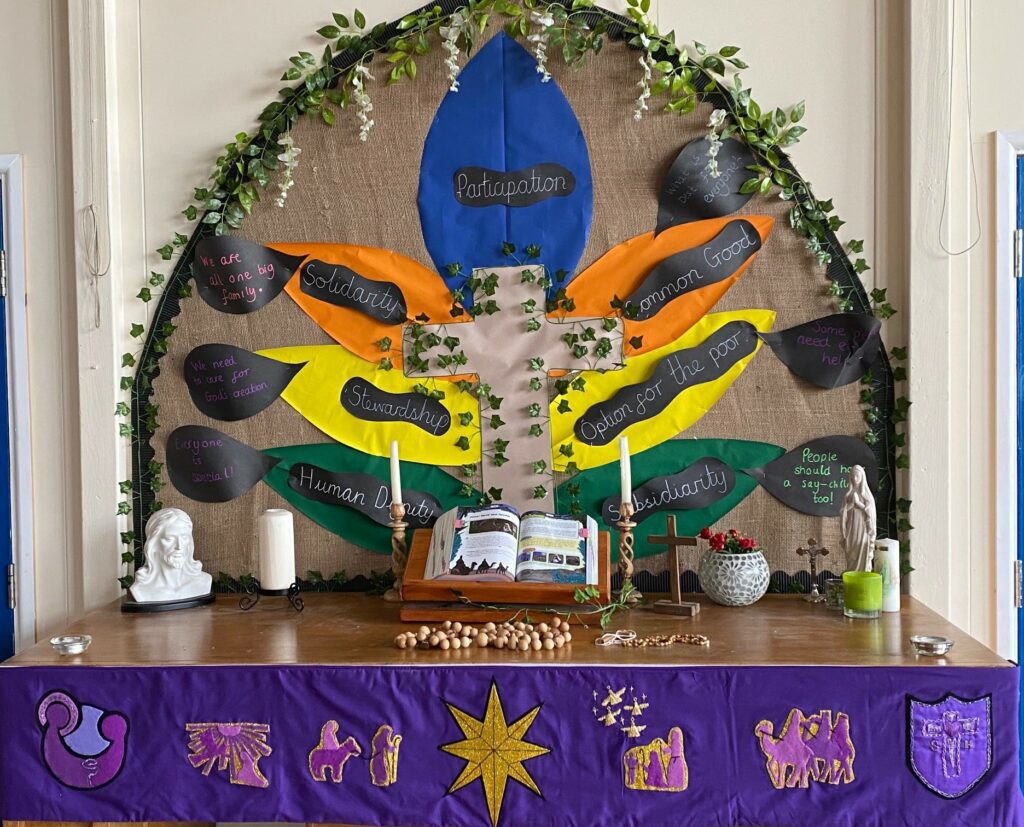Catholic Social Teaching

The church’s social teaching asks us all to ” read” the society, the signs of the times to see what is really going on around us. We then decide what we can do to make the situation better for everyone, especially those who are poor.
Pope Francis states that Catholic Social Teaching Principles are primarily positive. In Gaudium et Spes it states it ‘offers proposals, it works for change and in this sense it consistently points to the hope born of the loving heart of Jesus Christ’.
“Catholic Social Teaching in a sense is no more than trying to view what’s going on in society in our place and time through the lens of the Gospel and see what we might do to make the situation more like God’s loving plan for creation.”
Friel, Catholic Social Teachings, 2023. Pg 3
Catholic Social teachings inspires us all to make the world a better place for everyone.
Dignity:
We believe every human person is made in the image and likeness of God. This is a gift that we all share as fellow human beings; we are all infinitely loved by our Creator.
God is present in every human person, regardless of religion, culture, nationality, orientation or economic standing. Each one of us is unique and beautiful. We are called to treat every person and every creature with loving respect.
“Before I formed you in the womb, I knew you.”
Jeremiah 1:5
Solidarity:
Solidarity arises when we remember that we belong to each other. We should stand by everyone.
“In truth I tell you, in so far as you did this to one of the least of these brothers [or sisters] of mine, you did it to me.”
Matthew 25:40
The common good
The common good means that the fruits of the earth belong to everyone. No one should be excluded from the gifts of creation.
“You are not making a gift of your possessions to the poor person. You are handing over to them what is theirs.”
Saint Ambrose (340-397 AD)
Option for the poor:
The option for the poor reminds us of God’s preferential love for the poorest and most vulnerable people. God’s love is universal; he does not side with oppressors, but loves the humble.
“The spirit of the Lord is on me, for he has anointed me to bring the good news to the afflicted. He has sent me… to let the oppressed go free.”
Luke 4:18
Peace
Peace is a cornerstone of our faith. Christ, the Prince of Peace, sacrificed himself with love on the cross.
“Peace… is an order that is founded in truth, nurtured and animated by charity, and brought into effect under the auspices of freedom.”
Pacem in Terris, 1963, #167
Creation and environment
In the first pages of the Bible we read how God created the sun and the stars, the water and earth, and every creature. We believe Christ is the redeemer of all creation.
In 2015, Pope Francis brought together decades of Church teaching in the encyclical, Laudato Si’. In this deeply influential letter, Pope Francis invites everyone on the planet to consider how our actions are affecting the earth and the poorest people. Everything is interconnected, and all of creation praises God. It is our Christian vocation to care for creation.
“Who turned the wonderworld of the seas into underwater cemeteries bereft of colour and life?”
Catholic Bishops of the Philippines, 1988
As Catholic School we try and live out all of our CST Principles.
We try to be the change we want to see.
Through our: (links to pages)
-
Commitment to those in need
-
Eco Warriors,
-
Well- Being Ambassadors
-
House Captains and OPAL leaders
-
Methodology of decision making – everyone opinions, using surveys and stakeholder voice to consult and form policy and decisions.
-
Behaviour and Value Curriculum is rooted in dignity and reconciliation.
As a school we recycle to look after our common home and work hard in the area around us to litter pick and do good works in the community.
During our Celebration of the Word, we reflect on the scripture we hear and apply the message to our own lives – doing simple things to be the change we want to see.
We are currently reviewing our Curriculum. One of our aims of this review is to ensure that CSTs are present in every subject.
For example, in year 6 they study the Amazon Rainforest. Through the geography we look at the impact on the environment with trade ( Dignity), in Design and Technology the pupils look to design and make a model of a bridge across the amazon river. The pupils are asked to consider how may trees they would need to re plant o create the bridge ( Common Good) The pupils also look at trade and Fairtrade.
In year 1, the pupils look at the local environment, how we can look afer it better whole still using maps to develop geographic knowledge.
In our RSHE curriculum, we look at the dignity of the pupils and oher people as well as learning about Protected Characteristics.
Our Influencer Assemblies highlights Protected Characteristics in many influential people and the majority of units within ‘Our Curriculum’ have diversity links, to developing countries, social justice makers and leaders that they would not normally learn about. You can find examples of these in our curriculum intents.
We believe that if we incorporate the CST in the pupils learning, they will automatically mature to be good catholic citizens in modern Britain living out the CST daily i the future of our country.
In February 2024. we had a visit from a CAFOD volunteer.
All of the school took part in an assembly and then pupils in years 2 – year 6 took part in a workshop.
Photos to follow….





